Melbourne Business School: Business Incubator Effectiveness Report
VerifiedAdded on 2023/06/14
|9
|1974
|360
Report
AI Summary
This report investigates the effectiveness of business incubators in Melbourne in supporting Melbourne Business School students to establish start-up businesses. The research employs a post-positivism philosophy and a deductive approach, utilizing secondary data sources such as journals, articles, and websites. A descriptive research design is adopted, and thematic analysis is used to analyze the collected data. The report considers ethical considerations, including data privacy and compliance with the Data Protection Act 1998. The research aims to determine the role played by business incubators in Melbourne and their overall effectiveness in helping university students set up their start-up companies.

Running head: RESEARCH METHODOLOGY
Research Methodology
Name of the Student
Name of the University
Author note
Research Methodology
Name of the Student
Name of the University
Author note
Paraphrase This Document
Need a fresh take? Get an instant paraphrase of this document with our AI Paraphraser
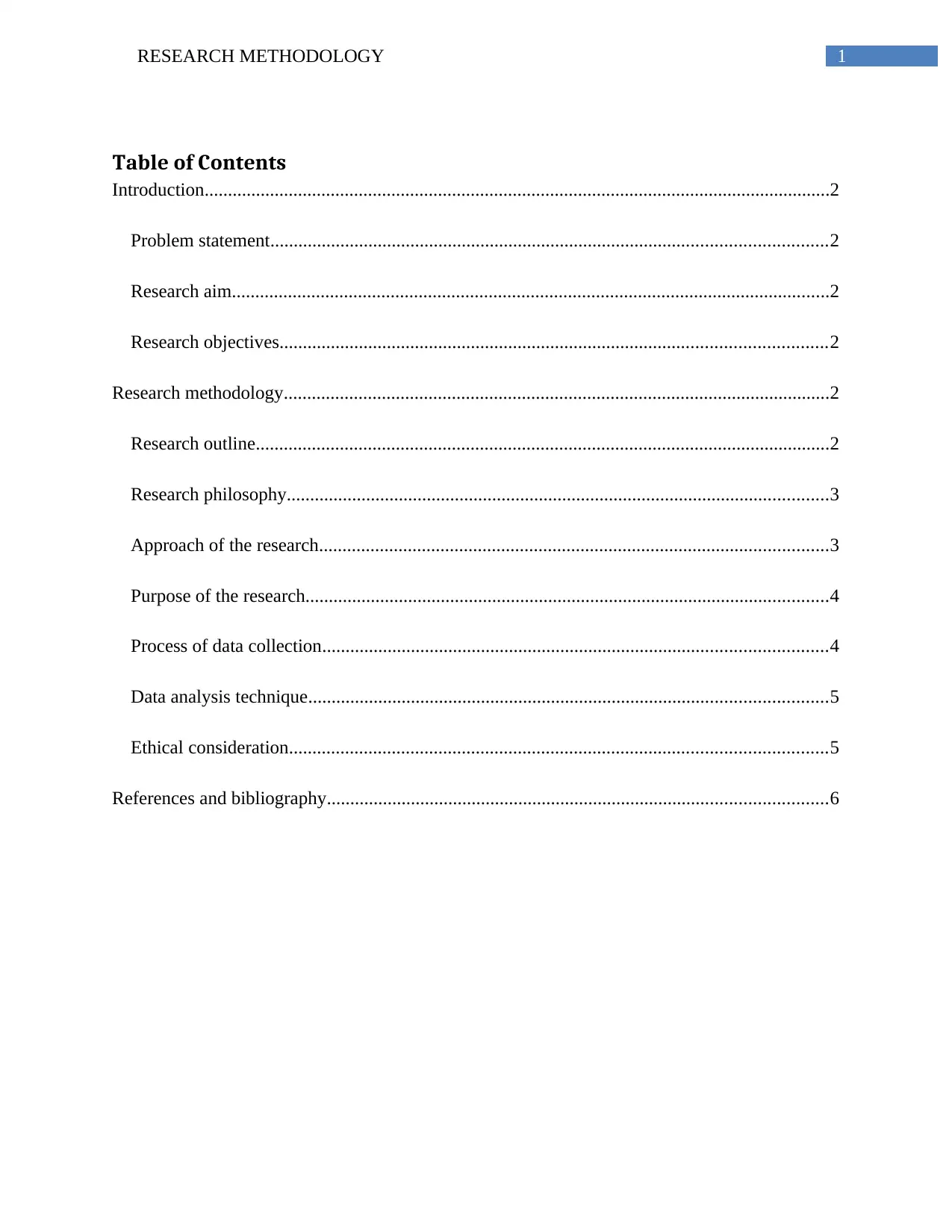
1RESEARCH METHODOLOGY
Table of Contents
Introduction......................................................................................................................................2
Problem statement.......................................................................................................................2
Research aim................................................................................................................................2
Research objectives.....................................................................................................................2
Research methodology.....................................................................................................................2
Research outline...........................................................................................................................2
Research philosophy....................................................................................................................3
Approach of the research.............................................................................................................3
Purpose of the research................................................................................................................4
Process of data collection............................................................................................................4
Data analysis technique...............................................................................................................5
Ethical consideration...................................................................................................................5
References and bibliography...........................................................................................................6
Table of Contents
Introduction......................................................................................................................................2
Problem statement.......................................................................................................................2
Research aim................................................................................................................................2
Research objectives.....................................................................................................................2
Research methodology.....................................................................................................................2
Research outline...........................................................................................................................2
Research philosophy....................................................................................................................3
Approach of the research.............................................................................................................3
Purpose of the research................................................................................................................4
Process of data collection............................................................................................................4
Data analysis technique...............................................................................................................5
Ethical consideration...................................................................................................................5
References and bibliography...........................................................................................................6
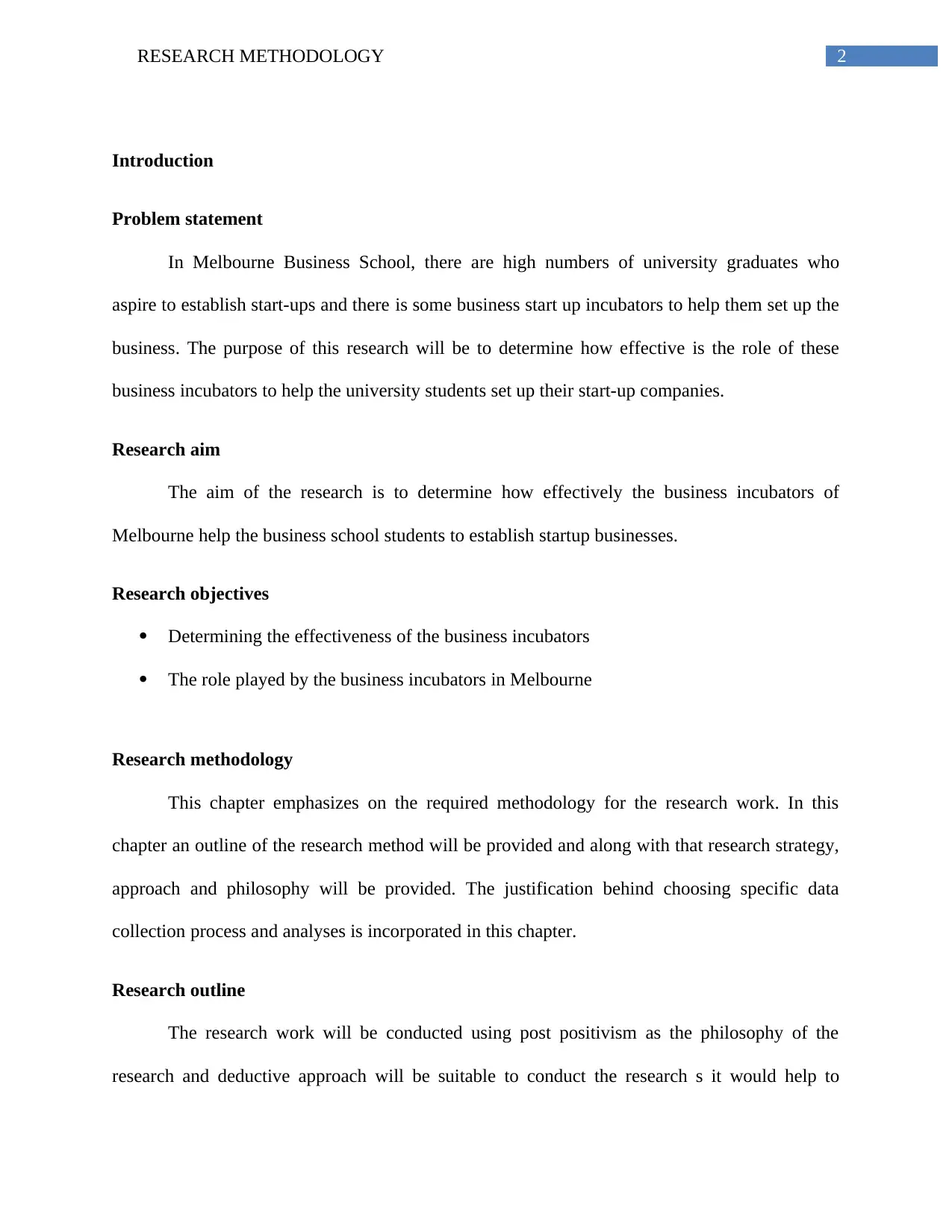
2RESEARCH METHODOLOGY
Introduction
Problem statement
In Melbourne Business School, there are high numbers of university graduates who
aspire to establish start-ups and there is some business start up incubators to help them set up the
business. The purpose of this research will be to determine how effective is the role of these
business incubators to help the university students set up their start-up companies.
Research aim
The aim of the research is to determine how effectively the business incubators of
Melbourne help the business school students to establish startup businesses.
Research objectives
Determining the effectiveness of the business incubators
The role played by the business incubators in Melbourne
Research methodology
This chapter emphasizes on the required methodology for the research work. In this
chapter an outline of the research method will be provided and along with that research strategy,
approach and philosophy will be provided. The justification behind choosing specific data
collection process and analyses is incorporated in this chapter.
Research outline
The research work will be conducted using post positivism as the philosophy of the
research and deductive approach will be suitable to conduct the research s it would help to
Introduction
Problem statement
In Melbourne Business School, there are high numbers of university graduates who
aspire to establish start-ups and there is some business start up incubators to help them set up the
business. The purpose of this research will be to determine how effective is the role of these
business incubators to help the university students set up their start-up companies.
Research aim
The aim of the research is to determine how effectively the business incubators of
Melbourne help the business school students to establish startup businesses.
Research objectives
Determining the effectiveness of the business incubators
The role played by the business incubators in Melbourne
Research methodology
This chapter emphasizes on the required methodology for the research work. In this
chapter an outline of the research method will be provided and along with that research strategy,
approach and philosophy will be provided. The justification behind choosing specific data
collection process and analyses is incorporated in this chapter.
Research outline
The research work will be conducted using post positivism as the philosophy of the
research and deductive approach will be suitable to conduct the research s it would help to
⊘ This is a preview!⊘
Do you want full access?
Subscribe today to unlock all pages.

Trusted by 1+ million students worldwide
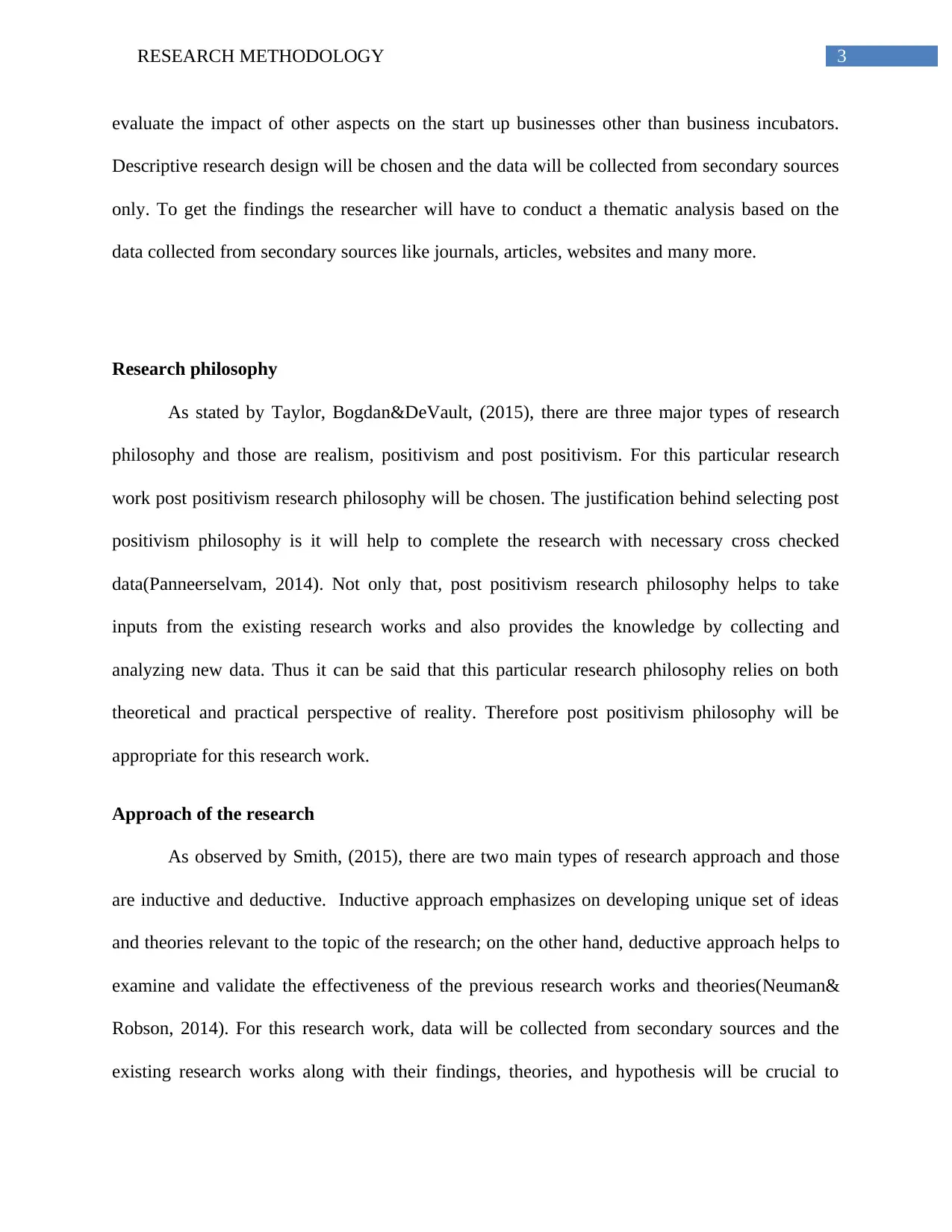
3RESEARCH METHODOLOGY
evaluate the impact of other aspects on the start up businesses other than business incubators.
Descriptive research design will be chosen and the data will be collected from secondary sources
only. To get the findings the researcher will have to conduct a thematic analysis based on the
data collected from secondary sources like journals, articles, websites and many more.
Research philosophy
As stated by Taylor, Bogdan&DeVault, (2015), there are three major types of research
philosophy and those are realism, positivism and post positivism. For this particular research
work post positivism research philosophy will be chosen. The justification behind selecting post
positivism philosophy is it will help to complete the research with necessary cross checked
data(Panneerselvam, 2014). Not only that, post positivism research philosophy helps to take
inputs from the existing research works and also provides the knowledge by collecting and
analyzing new data. Thus it can be said that this particular research philosophy relies on both
theoretical and practical perspective of reality. Therefore post positivism philosophy will be
appropriate for this research work.
Approach of the research
As observed by Smith, (2015), there are two main types of research approach and those
are inductive and deductive. Inductive approach emphasizes on developing unique set of ideas
and theories relevant to the topic of the research; on the other hand, deductive approach helps to
examine and validate the effectiveness of the previous research works and theories(Neuman&
Robson, 2014). For this research work, data will be collected from secondary sources and the
existing research works along with their findings, theories, and hypothesis will be crucial to
evaluate the impact of other aspects on the start up businesses other than business incubators.
Descriptive research design will be chosen and the data will be collected from secondary sources
only. To get the findings the researcher will have to conduct a thematic analysis based on the
data collected from secondary sources like journals, articles, websites and many more.
Research philosophy
As stated by Taylor, Bogdan&DeVault, (2015), there are three major types of research
philosophy and those are realism, positivism and post positivism. For this particular research
work post positivism research philosophy will be chosen. The justification behind selecting post
positivism philosophy is it will help to complete the research with necessary cross checked
data(Panneerselvam, 2014). Not only that, post positivism research philosophy helps to take
inputs from the existing research works and also provides the knowledge by collecting and
analyzing new data. Thus it can be said that this particular research philosophy relies on both
theoretical and practical perspective of reality. Therefore post positivism philosophy will be
appropriate for this research work.
Approach of the research
As observed by Smith, (2015), there are two main types of research approach and those
are inductive and deductive. Inductive approach emphasizes on developing unique set of ideas
and theories relevant to the topic of the research; on the other hand, deductive approach helps to
examine and validate the effectiveness of the previous research works and theories(Neuman&
Robson, 2014). For this research work, data will be collected from secondary sources and the
existing research works along with their findings, theories, and hypothesis will be crucial to
Paraphrase This Document
Need a fresh take? Get an instant paraphrase of this document with our AI Paraphraser
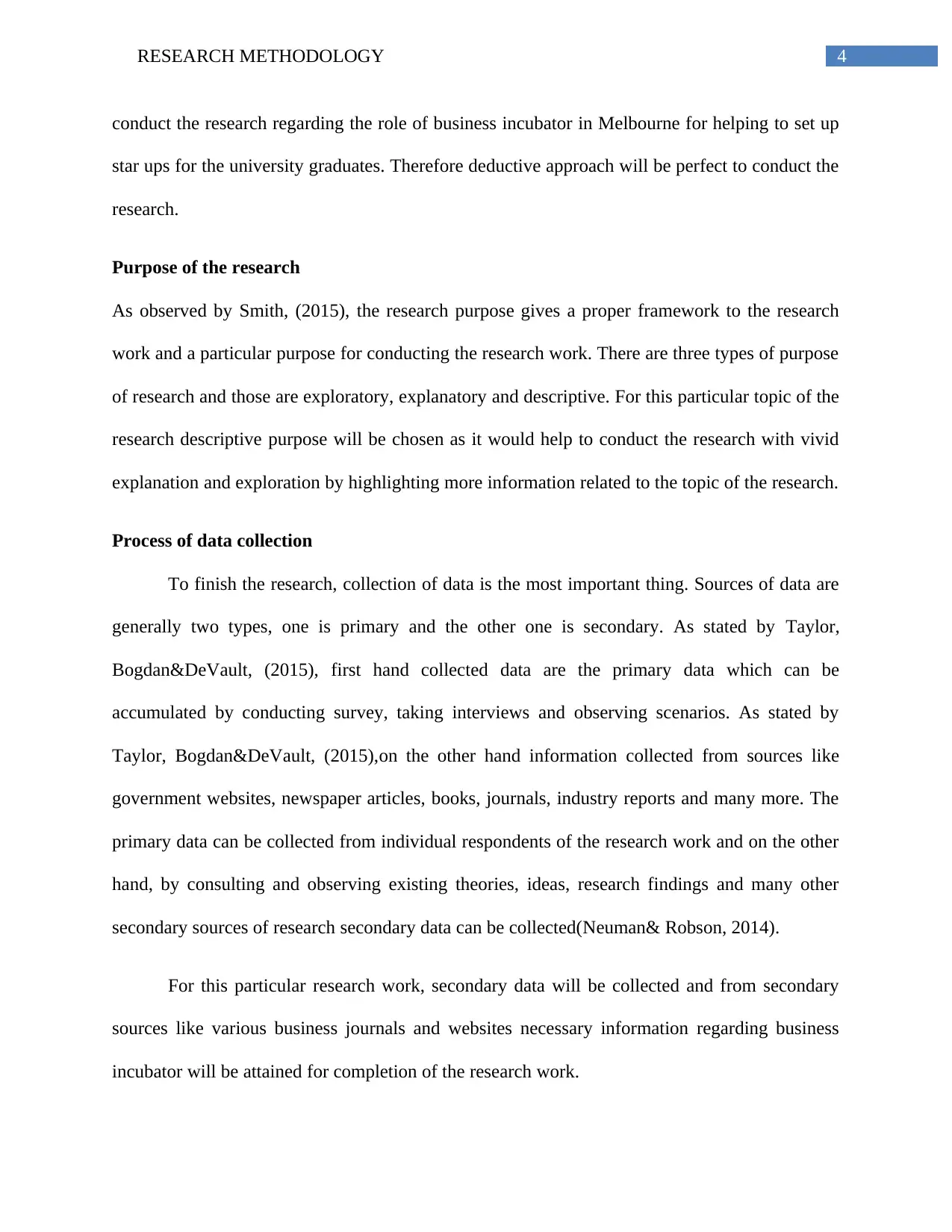
4RESEARCH METHODOLOGY
conduct the research regarding the role of business incubator in Melbourne for helping to set up
star ups for the university graduates. Therefore deductive approach will be perfect to conduct the
research.
Purpose of the research
As observed by Smith, (2015), the research purpose gives a proper framework to the research
work and a particular purpose for conducting the research work. There are three types of purpose
of research and those are exploratory, explanatory and descriptive. For this particular topic of the
research descriptive purpose will be chosen as it would help to conduct the research with vivid
explanation and exploration by highlighting more information related to the topic of the research.
Process of data collection
To finish the research, collection of data is the most important thing. Sources of data are
generally two types, one is primary and the other one is secondary. As stated by Taylor,
Bogdan&DeVault, (2015), first hand collected data are the primary data which can be
accumulated by conducting survey, taking interviews and observing scenarios. As stated by
Taylor, Bogdan&DeVault, (2015),on the other hand information collected from sources like
government websites, newspaper articles, books, journals, industry reports and many more. The
primary data can be collected from individual respondents of the research work and on the other
hand, by consulting and observing existing theories, ideas, research findings and many other
secondary sources of research secondary data can be collected(Neuman& Robson, 2014).
For this particular research work, secondary data will be collected and from secondary
sources like various business journals and websites necessary information regarding business
incubator will be attained for completion of the research work.
conduct the research regarding the role of business incubator in Melbourne for helping to set up
star ups for the university graduates. Therefore deductive approach will be perfect to conduct the
research.
Purpose of the research
As observed by Smith, (2015), the research purpose gives a proper framework to the research
work and a particular purpose for conducting the research work. There are three types of purpose
of research and those are exploratory, explanatory and descriptive. For this particular topic of the
research descriptive purpose will be chosen as it would help to conduct the research with vivid
explanation and exploration by highlighting more information related to the topic of the research.
Process of data collection
To finish the research, collection of data is the most important thing. Sources of data are
generally two types, one is primary and the other one is secondary. As stated by Taylor,
Bogdan&DeVault, (2015), first hand collected data are the primary data which can be
accumulated by conducting survey, taking interviews and observing scenarios. As stated by
Taylor, Bogdan&DeVault, (2015),on the other hand information collected from sources like
government websites, newspaper articles, books, journals, industry reports and many more. The
primary data can be collected from individual respondents of the research work and on the other
hand, by consulting and observing existing theories, ideas, research findings and many other
secondary sources of research secondary data can be collected(Neuman& Robson, 2014).
For this particular research work, secondary data will be collected and from secondary
sources like various business journals and websites necessary information regarding business
incubator will be attained for completion of the research work.
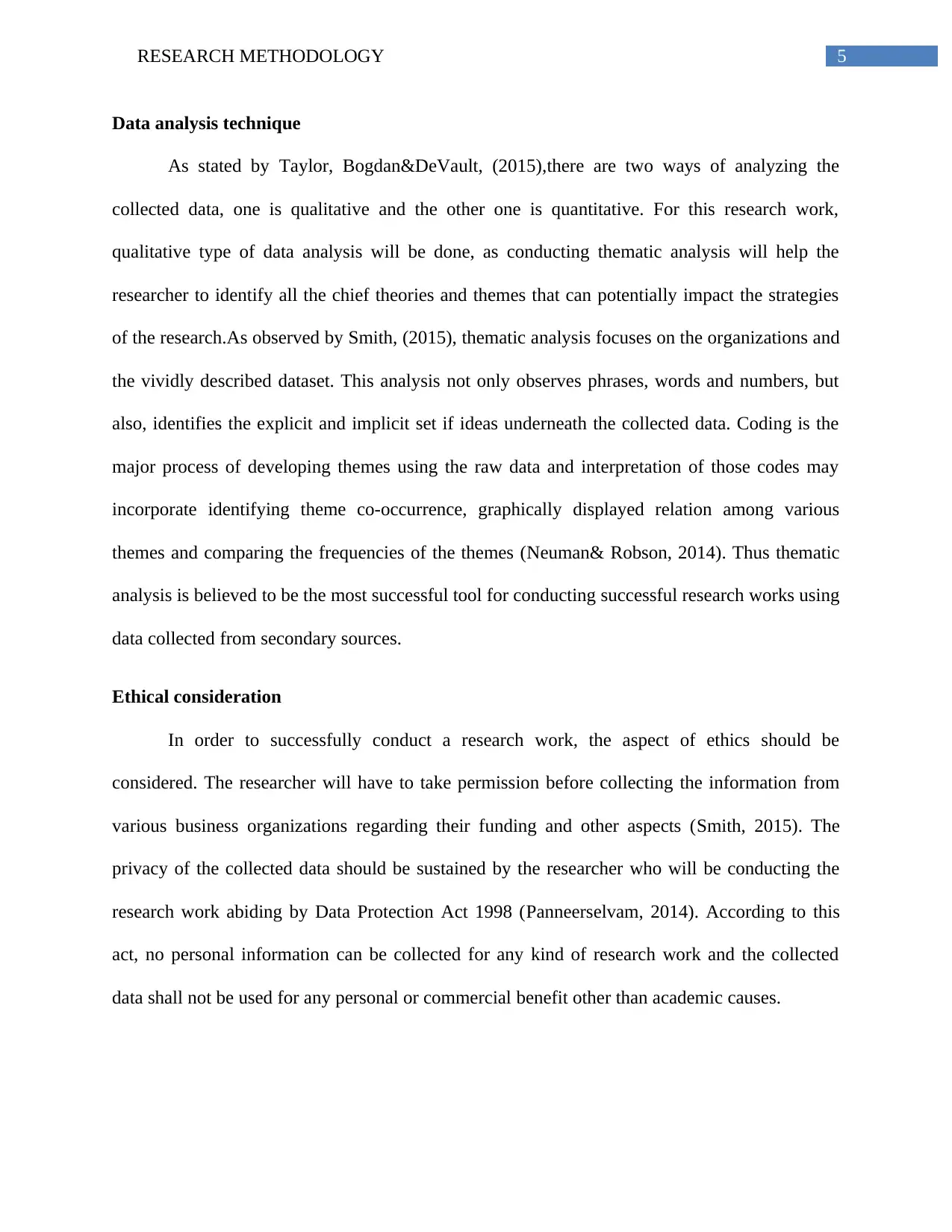
5RESEARCH METHODOLOGY
Data analysis technique
As stated by Taylor, Bogdan&DeVault, (2015),there are two ways of analyzing the
collected data, one is qualitative and the other one is quantitative. For this research work,
qualitative type of data analysis will be done, as conducting thematic analysis will help the
researcher to identify all the chief theories and themes that can potentially impact the strategies
of the research.As observed by Smith, (2015), thematic analysis focuses on the organizations and
the vividly described dataset. This analysis not only observes phrases, words and numbers, but
also, identifies the explicit and implicit set if ideas underneath the collected data. Coding is the
major process of developing themes using the raw data and interpretation of those codes may
incorporate identifying theme co-occurrence, graphically displayed relation among various
themes and comparing the frequencies of the themes (Neuman& Robson, 2014). Thus thematic
analysis is believed to be the most successful tool for conducting successful research works using
data collected from secondary sources.
Ethical consideration
In order to successfully conduct a research work, the aspect of ethics should be
considered. The researcher will have to take permission before collecting the information from
various business organizations regarding their funding and other aspects (Smith, 2015). The
privacy of the collected data should be sustained by the researcher who will be conducting the
research work abiding by Data Protection Act 1998 (Panneerselvam, 2014). According to this
act, no personal information can be collected for any kind of research work and the collected
data shall not be used for any personal or commercial benefit other than academic causes.
Data analysis technique
As stated by Taylor, Bogdan&DeVault, (2015),there are two ways of analyzing the
collected data, one is qualitative and the other one is quantitative. For this research work,
qualitative type of data analysis will be done, as conducting thematic analysis will help the
researcher to identify all the chief theories and themes that can potentially impact the strategies
of the research.As observed by Smith, (2015), thematic analysis focuses on the organizations and
the vividly described dataset. This analysis not only observes phrases, words and numbers, but
also, identifies the explicit and implicit set if ideas underneath the collected data. Coding is the
major process of developing themes using the raw data and interpretation of those codes may
incorporate identifying theme co-occurrence, graphically displayed relation among various
themes and comparing the frequencies of the themes (Neuman& Robson, 2014). Thus thematic
analysis is believed to be the most successful tool for conducting successful research works using
data collected from secondary sources.
Ethical consideration
In order to successfully conduct a research work, the aspect of ethics should be
considered. The researcher will have to take permission before collecting the information from
various business organizations regarding their funding and other aspects (Smith, 2015). The
privacy of the collected data should be sustained by the researcher who will be conducting the
research work abiding by Data Protection Act 1998 (Panneerselvam, 2014). According to this
act, no personal information can be collected for any kind of research work and the collected
data shall not be used for any personal or commercial benefit other than academic causes.
⊘ This is a preview!⊘
Do you want full access?
Subscribe today to unlock all pages.

Trusted by 1+ million students worldwide
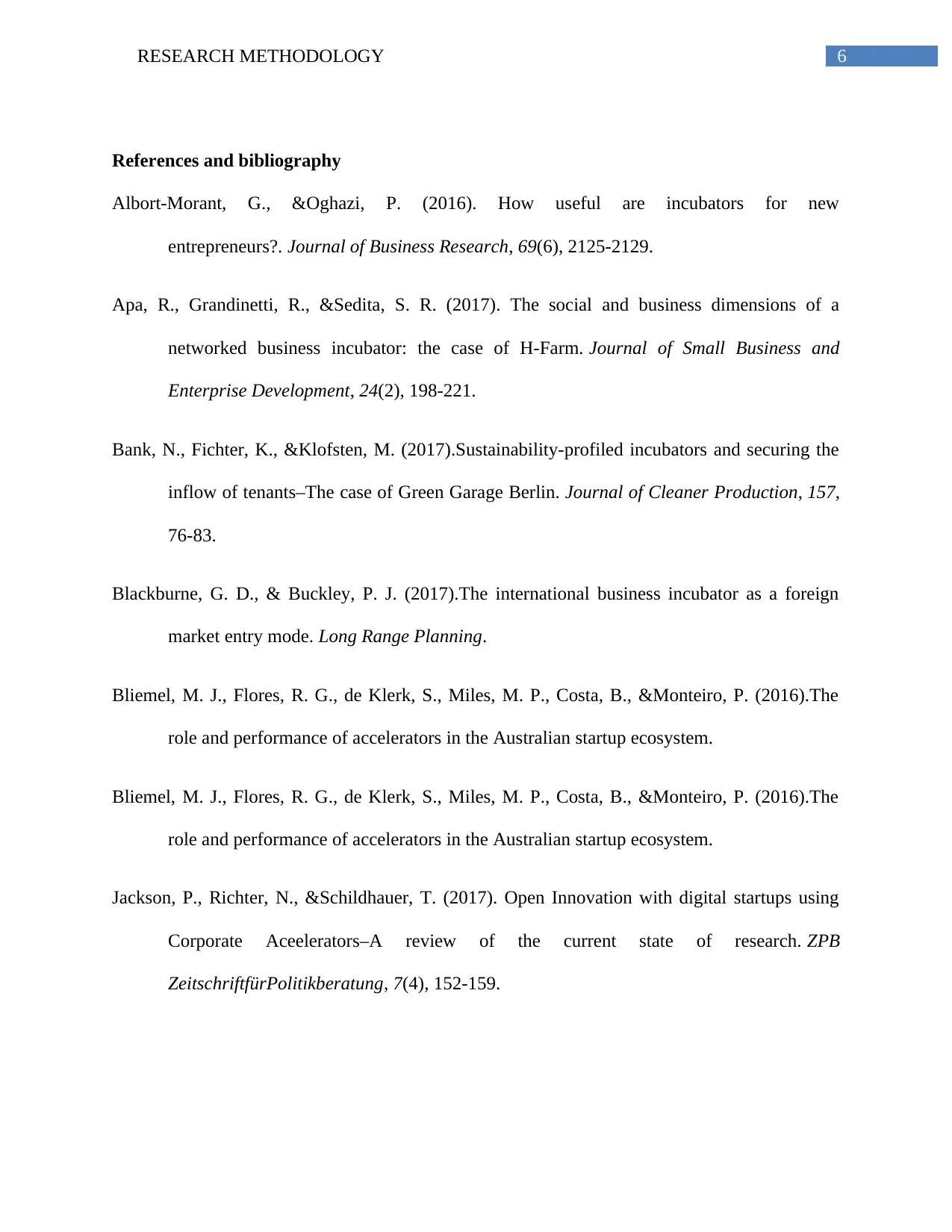
6RESEARCH METHODOLOGY
References and bibliography
Albort-Morant, G., &Oghazi, P. (2016). How useful are incubators for new
entrepreneurs?. Journal of Business Research, 69(6), 2125-2129.
Apa, R., Grandinetti, R., &Sedita, S. R. (2017). The social and business dimensions of a
networked business incubator: the case of H-Farm. Journal of Small Business and
Enterprise Development, 24(2), 198-221.
Bank, N., Fichter, K., &Klofsten, M. (2017).Sustainability-profiled incubators and securing the
inflow of tenants–The case of Green Garage Berlin. Journal of Cleaner Production, 157,
76-83.
Blackburne, G. D., & Buckley, P. J. (2017).The international business incubator as a foreign
market entry mode. Long Range Planning.
Bliemel, M. J., Flores, R. G., de Klerk, S., Miles, M. P., Costa, B., &Monteiro, P. (2016).The
role and performance of accelerators in the Australian startup ecosystem.
Bliemel, M. J., Flores, R. G., de Klerk, S., Miles, M. P., Costa, B., &Monteiro, P. (2016).The
role and performance of accelerators in the Australian startup ecosystem.
Jackson, P., Richter, N., &Schildhauer, T. (2017). Open Innovation with digital startups using
Corporate Aceelerators–A review of the current state of research. ZPB
ZeitschriftfürPolitikberatung, 7(4), 152-159.
References and bibliography
Albort-Morant, G., &Oghazi, P. (2016). How useful are incubators for new
entrepreneurs?. Journal of Business Research, 69(6), 2125-2129.
Apa, R., Grandinetti, R., &Sedita, S. R. (2017). The social and business dimensions of a
networked business incubator: the case of H-Farm. Journal of Small Business and
Enterprise Development, 24(2), 198-221.
Bank, N., Fichter, K., &Klofsten, M. (2017).Sustainability-profiled incubators and securing the
inflow of tenants–The case of Green Garage Berlin. Journal of Cleaner Production, 157,
76-83.
Blackburne, G. D., & Buckley, P. J. (2017).The international business incubator as a foreign
market entry mode. Long Range Planning.
Bliemel, M. J., Flores, R. G., de Klerk, S., Miles, M. P., Costa, B., &Monteiro, P. (2016).The
role and performance of accelerators in the Australian startup ecosystem.
Bliemel, M. J., Flores, R. G., de Klerk, S., Miles, M. P., Costa, B., &Monteiro, P. (2016).The
role and performance of accelerators in the Australian startup ecosystem.
Jackson, P., Richter, N., &Schildhauer, T. (2017). Open Innovation with digital startups using
Corporate Aceelerators–A review of the current state of research. ZPB
ZeitschriftfürPolitikberatung, 7(4), 152-159.
Paraphrase This Document
Need a fresh take? Get an instant paraphrase of this document with our AI Paraphraser
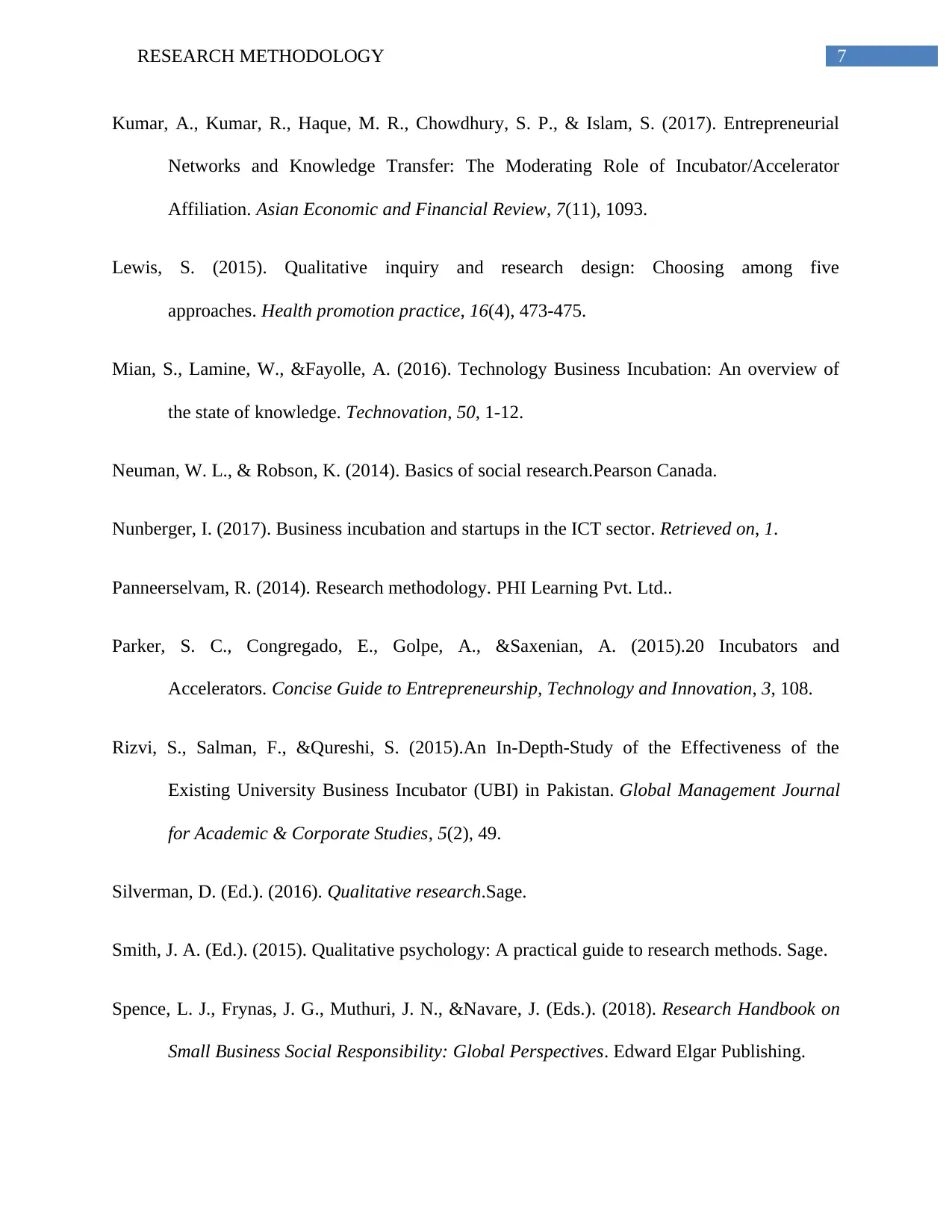
7RESEARCH METHODOLOGY
Kumar, A., Kumar, R., Haque, M. R., Chowdhury, S. P., & Islam, S. (2017). Entrepreneurial
Networks and Knowledge Transfer: The Moderating Role of Incubator/Accelerator
Affiliation. Asian Economic and Financial Review, 7(11), 1093.
Lewis, S. (2015). Qualitative inquiry and research design: Choosing among five
approaches. Health promotion practice, 16(4), 473-475.
Mian, S., Lamine, W., &Fayolle, A. (2016). Technology Business Incubation: An overview of
the state of knowledge. Technovation, 50, 1-12.
Neuman, W. L., & Robson, K. (2014). Basics of social research.Pearson Canada.
Nunberger, I. (2017). Business incubation and startups in the ICT sector. Retrieved on, 1.
Panneerselvam, R. (2014). Research methodology. PHI Learning Pvt. Ltd..
Parker, S. C., Congregado, E., Golpe, A., &Saxenian, A. (2015).20 Incubators and
Accelerators. Concise Guide to Entrepreneurship, Technology and Innovation, 3, 108.
Rizvi, S., Salman, F., &Qureshi, S. (2015).An In-Depth-Study of the Effectiveness of the
Existing University Business Incubator (UBI) in Pakistan. Global Management Journal
for Academic & Corporate Studies, 5(2), 49.
Silverman, D. (Ed.). (2016). Qualitative research.Sage.
Smith, J. A. (Ed.). (2015). Qualitative psychology: A practical guide to research methods. Sage.
Spence, L. J., Frynas, J. G., Muthuri, J. N., &Navare, J. (Eds.). (2018). Research Handbook on
Small Business Social Responsibility: Global Perspectives. Edward Elgar Publishing.
Kumar, A., Kumar, R., Haque, M. R., Chowdhury, S. P., & Islam, S. (2017). Entrepreneurial
Networks and Knowledge Transfer: The Moderating Role of Incubator/Accelerator
Affiliation. Asian Economic and Financial Review, 7(11), 1093.
Lewis, S. (2015). Qualitative inquiry and research design: Choosing among five
approaches. Health promotion practice, 16(4), 473-475.
Mian, S., Lamine, W., &Fayolle, A. (2016). Technology Business Incubation: An overview of
the state of knowledge. Technovation, 50, 1-12.
Neuman, W. L., & Robson, K. (2014). Basics of social research.Pearson Canada.
Nunberger, I. (2017). Business incubation and startups in the ICT sector. Retrieved on, 1.
Panneerselvam, R. (2014). Research methodology. PHI Learning Pvt. Ltd..
Parker, S. C., Congregado, E., Golpe, A., &Saxenian, A. (2015).20 Incubators and
Accelerators. Concise Guide to Entrepreneurship, Technology and Innovation, 3, 108.
Rizvi, S., Salman, F., &Qureshi, S. (2015).An In-Depth-Study of the Effectiveness of the
Existing University Business Incubator (UBI) in Pakistan. Global Management Journal
for Academic & Corporate Studies, 5(2), 49.
Silverman, D. (Ed.). (2016). Qualitative research.Sage.
Smith, J. A. (Ed.). (2015). Qualitative psychology: A practical guide to research methods. Sage.
Spence, L. J., Frynas, J. G., Muthuri, J. N., &Navare, J. (Eds.). (2018). Research Handbook on
Small Business Social Responsibility: Global Perspectives. Edward Elgar Publishing.
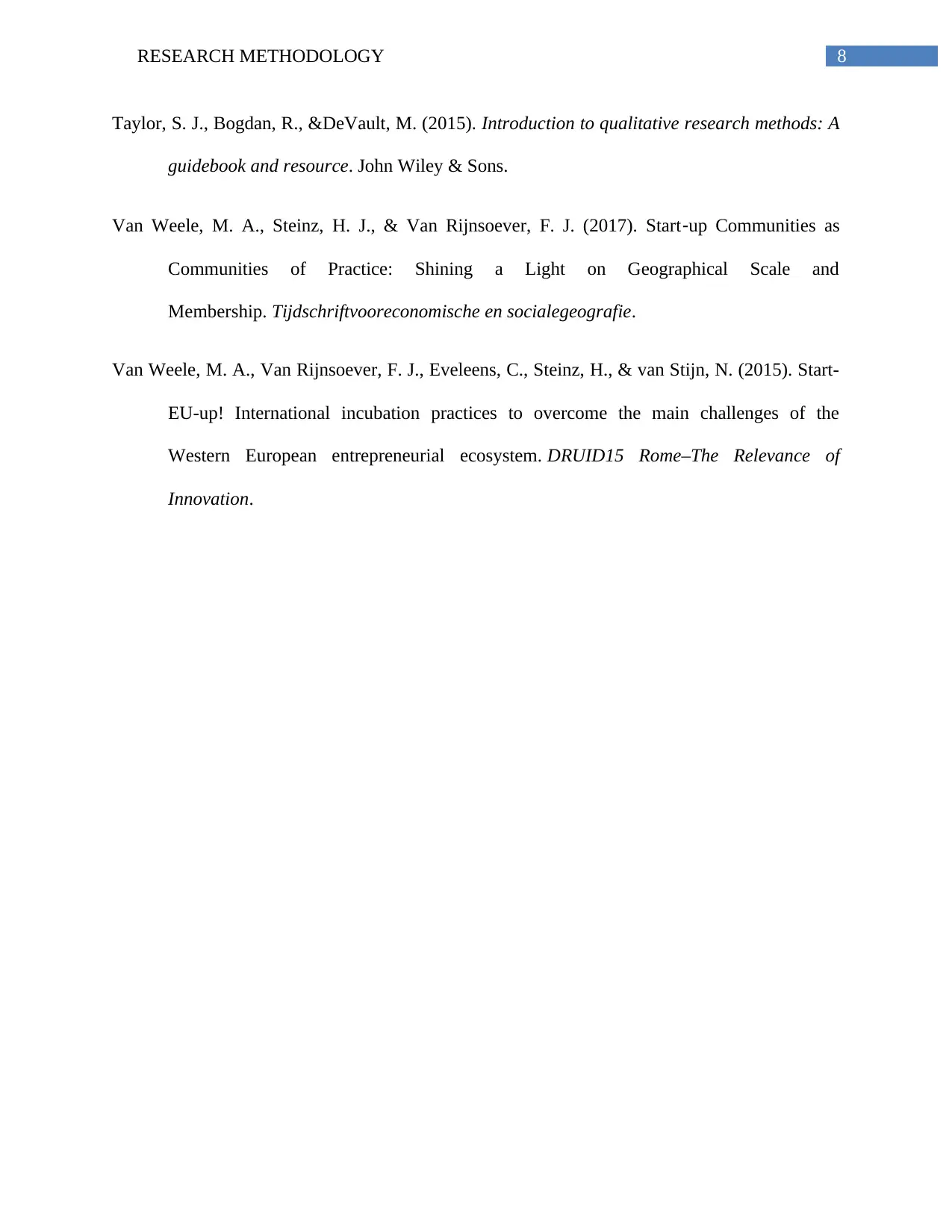
8RESEARCH METHODOLOGY
Taylor, S. J., Bogdan, R., &DeVault, M. (2015). Introduction to qualitative research methods: A
guidebook and resource. John Wiley & Sons.
Van Weele, M. A., Steinz, H. J., & Van Rijnsoever, F. J. (2017). Start‐up Communities as
Communities of Practice: Shining a Light on Geographical Scale and
Membership. Tijdschriftvooreconomische en socialegeografie.
Van Weele, M. A., Van Rijnsoever, F. J., Eveleens, C., Steinz, H., & van Stijn, N. (2015). Start-
EU-up! International incubation practices to overcome the main challenges of the
Western European entrepreneurial ecosystem. DRUID15 Rome–The Relevance of
Innovation.
Taylor, S. J., Bogdan, R., &DeVault, M. (2015). Introduction to qualitative research methods: A
guidebook and resource. John Wiley & Sons.
Van Weele, M. A., Steinz, H. J., & Van Rijnsoever, F. J. (2017). Start‐up Communities as
Communities of Practice: Shining a Light on Geographical Scale and
Membership. Tijdschriftvooreconomische en socialegeografie.
Van Weele, M. A., Van Rijnsoever, F. J., Eveleens, C., Steinz, H., & van Stijn, N. (2015). Start-
EU-up! International incubation practices to overcome the main challenges of the
Western European entrepreneurial ecosystem. DRUID15 Rome–The Relevance of
Innovation.
⊘ This is a preview!⊘
Do you want full access?
Subscribe today to unlock all pages.

Trusted by 1+ million students worldwide
1 out of 9
Related Documents
Your All-in-One AI-Powered Toolkit for Academic Success.
+13062052269
info@desklib.com
Available 24*7 on WhatsApp / Email
![[object Object]](/_next/static/media/star-bottom.7253800d.svg)
Unlock your academic potential
Copyright © 2020–2026 A2Z Services. All Rights Reserved. Developed and managed by ZUCOL.





